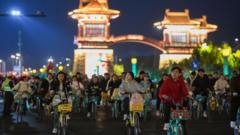In what began as an adventurous social media quest for breakfast dumplings, a wave of cyclists descended upon the six-lane expressway between Zhengzhou and Kaifeng, creating unprecedented traffic congestion. The event, coined “Night Ride to Kaifeng," was initially a humorous venture encouraged by local media and government officials but quickly spiraled into chaos as an estimated 100,000 to 200,000 cyclists participated in the late-night ride.
This phenomenon traces back to a group of four university students who, in June, cycled 50 km (30 miles) to taste the city’s renowned guantangbao, or soup dumplings. Their carefree message resonated with young adults grappling with stressful work environments and stagnant job prospects. "You don't get a second chance at youth," one of the students remarked, igniting a trend among restless youths in the city of 12.6 million.
Initial responses from the Kaifeng government involved celebratory announcements, discounts for college students, and traffic controls to facilitate the ride. Excitement soared, with participants expressing joy and nostalgia, while some individuals even joined in on motorbikes to experience the camaraderie. However, the celebratory atmosphere turned sour when the sheer number of cyclists began to choke major roadways, forcing many to abandon their bikes and struggle through the congested streets.
Witnesses reported that what usually takes an hour to drive turned into a three-hour ordeal due to overwhelming traffic. Social media painted a picture of frustration, as many riders faced difficulties finding accommodations or transportation upon arrival in Kaifeng. The once joyous atmosphere gave way to complaints about littering and the burden placed on local residents.
In response to this chaotic situation, bike rental companies urged users to forego cycling for long distances, advising the use of trains or buses instead. The surge in activity prompted some universities to restrict student movements, reflecting a broader trend of caution observed by authorities in past public gatherings. With mounting pressure to control large crowds, traffic police enacted closures on primary cycling routes, highlighting the precarious balance between youthful expression and public order in China.
As young people continue to seek out spontaneous experiences amidst a challenging economic backdrop, advocates suggest these events, despite their chaos, play a crucial role in fostering a sense of joy and connection in a demanding society. "Because happiness is infectious," one participant summarized, underscoring the enduring need for escapism among China's youth.

















